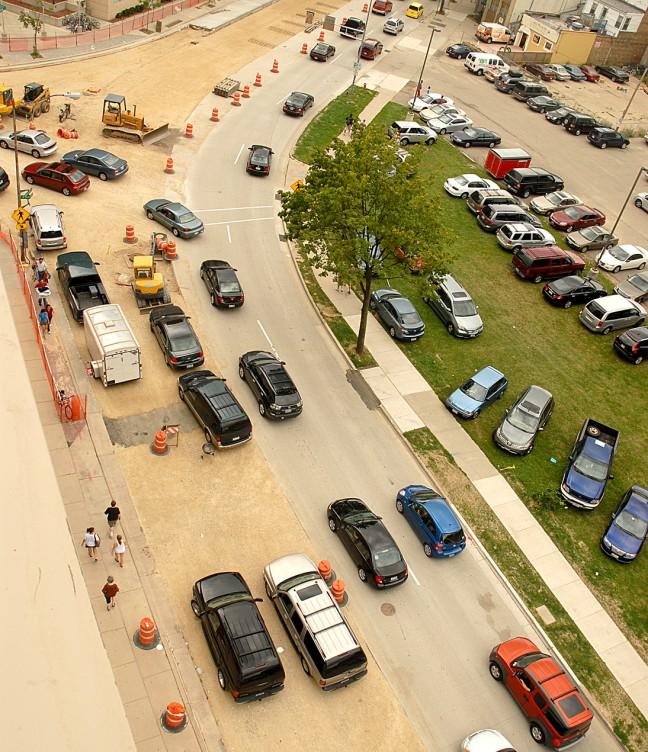Students at the University of Wisconsin know the chaos of campus during rush hour. When streets are lined with honking cars and increasingly frustrated drivers, Madison crosswalks can become dangerous for college kids attempting to get to class.
With Madison coming in at #16 in the country for having the worst drivers, it is no wonder why the university’s campus has become impossible to navigate safely during periods of intense traffic. Perhaps this is why UW decided to invest in a new strategy for tackling increased traffic incidents.
Last week, the city of Racine, which is about two hours east of Madison, announced plans to experiment with driverless vehicles. The city’s mayor Cory Mason revealed the new autonomous car — the Racine Badger — will be tested on the Gateway Technical College’s campus in the upcoming months.
This project is in collaboration with UW and comes after the U.S. Department of Transportation designated UW to be one of ten automated vehicle proving grounds for self-driving vehicles back in 2017.
Odyssey Beyond Bars’ success shows need to fund rehabilitative programs for incarcerated individuals
This type of technology has been in the works for years. Tesla in particular has paved the way for automobile autonomy, with self-driving hardware now present in all of its most recent models.
The potential of these recent developments have been impressive. In 2019, 94% of car crashes were due to human error. A University of Michigan factsheet estimates that autonomous vehicles could reduce these types of crashes by 90%.
This is something UW is especially keen on working toward on its campus. UW’s Traffic and Operations Safety Lab director David Noyce said the Racine Badger uses sensors involving light detection and ranging to sense other vehicles and pedestrians in its vicinity.
Self-driving vehicles would also widen access to the road and provide drivers with more freedom and independence while traveling. For example, seniors and disabled individuals would be able to exert more independence in their transportation because of the safety net automated cars provide. This technology could also improve traffic congestion — something sorely needed on UW’s campus during the school year.
So, what needs to be done to make self-driving cars a more prominent part of the Madison community and cities all across the country?
The first consideration is infrastructure. The New York Bureau Chief Jamie Lincoln Kitman has noted “Many driverless cars require smooth roads, with clearly painted lines, to position themselves. Potholes and other irregularities could become even bigger hazards.”
This means for autonomous cars to be safely integrated into the city, Madison must supply more funds for road construction and repair, especially in neighborhoods directly outside of the downtown area where road care has been neglected and conditions can become especially treacherous during the winter months.
Another more worrying consideration is the potential hackability of self-driving cars. This is a valid concern, especially during a time in which national security breaches are becoming more and more common. A troubling article by PurpleSec, a cyber security company, found that cybercrime had increased by 600% since the COVID-19 pandemic began.
The Wisconsin Automated Vehicle Proving Grounds association has already begun to consider solutions to the hacking of its cars, most notably with blockchain technology that it asserts would make its cars virtually unhackable. Further funding and testing of this technology is crucial.
Wisconsin dairy industry needs reform amid COP26 calls to fight climate change
Finally, affordability is key in making UW’s efforts successful in the long term and to result in widespread adoption of self-driving vehicle technologies. In a city already known for its lack of drivability and lack of affordable student parking, Madison is facing an uphill battle in encouraging its residents to own a car in the first place, let alone one that may be significantly more costly than other options on the market.
The benefits of autonomous vehicles can only be felt if they are widely adopted by a significant portion of the city, which means they must be financially feasible to everyone.
Despite the practical concerns and need for continued testing and solution-building, the fact remains that self-driving cars could prove to be groundbreaking for UW in its efforts to increase the safety and accessibility of campus.
While it may be many years before cars like the Racine Badger are widely available for public use, this development is promising for the future of autonomous vehicle technology coming to Wisconsin.
Fiona Hatch ([email protected]) is a freshman studying political science and international studies.





















